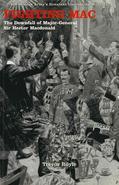On a spring morning in 1903, Major-General Sir Hector Macdonald, one of Britain's greatest military heroes, took his life in a hotel room in Paris. A few days later he was buried hastily in an Edinburgh cemetary as his fellow countrymen tried to come to terms with the fact that one of Scotland's most famous soldiers had ended his life rather than face charges against his character. The suicide and its aftermath created a national scandal and one which still reverberates long after those dramatic events - it is now clear that the official files dealing with his case, the papers of the Judge Advocate have been destroyed. Macdonald or 'Fighting Mac' as he was known to an adoring public, was no ordinary soldier. A crofter's son who had risen from the ranks in the Victorian army, he covered himself with glory during a long and successful military career and in 1898 was widely acknowledged as the true hero of the Battle of Omdurman, which cemented British Imperial rule in Anglo-Egyptian Sudan. Everything lay at his feet - a knighthood, honours, the respect of fellow generals such as Roberts and Kitchener - but Macdonald's career came to a shocking full stop when he stood accused of homosexuality and was ordered to face a court martial. Unable to come to terms with the disgrace, he committed suicide. That should have been the end of his story but so powerful was the myth created by Fighting Mac that people refused to believe he was dead. Soon rumours were circulating that Macdonald had faked his death and had adopted the persona of a prominent Prussian officer, the future Field Marshal August con Mackensen, one of Germany's great leaders during the First World War. FIGHTING MAC tells the true story behind his disgrace and sheds new light on the myths.
-
- Categories
- Other
- Asian Food
- Thai Food
- Italian Food
- Pizza
- BBQ & Grill
- Indian Food
- Chinese Food
- Seafood
- Kebab
- Dessert
- Burgers
- Halal Food
- Drinks
- Salad
- Pasta
- Soup
- Lamb
- Beef
- Spanish Food
- Greek Food
- Pork
- Mexican Food
- Pastry
- Cocktails, Punch & Alcoholic Drinks
- French Food
- Portuguese Food
- British Food
- Moroccan Food
- Chicken
- Chef Recommendation
- Restaurant
- Cafe
- Where to Eat?
- For Home
- Fashion
- Decoration
- Food Products
- Business Services
- New
- Popular
- Gifts
- Videos
- Help / Contact Us
- Terms & Privacy
- What is FoodTerest


